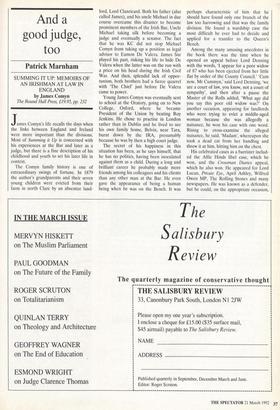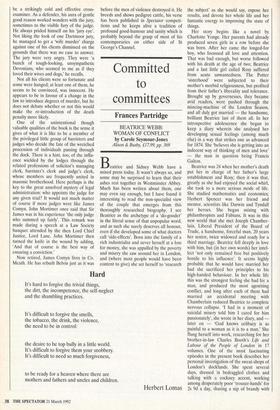And a good judge, too
Patrick Marnham
SUMMING IT UP: MEMOIRS OF AN IRISHMAN AT LAW IN ENGLAND by James Comyn The Round Hall Press, L19.95, pp. 232 James Comyn's life recalls the days when the links between England and Ireland were more important than the divisions. Most of Summing it Up is concerned with his experiences at the Bar and later as a judge, but there is a fine description of his childhood and youth to set his later life in context.
The Comyn family history is one of extraordinary swings of fortune. In 1879 the author's grandparents and their seven young children were evicted from their farm in north Clare by an absentee land-
lord, Lord Clanricard. Both his father (also called James), and his uncle Michael in due course overcame this disaster to become prominent members of the Irish Bar, Uncle Michael taking silk before becoming a judge and eventually a senator. The fact that he was KC did not stop Michael Comyn from taking up a position as legal advisor to Eamon De Valera. James Snr played his part, risking his life to hide De Valera when the latter was on the run with a price on his head during the Irish Civil War. And then, splendid lack of oppor- tunism, both brothers had a fierce quarrel with 'The Chief' just before De Valera came to power.
Young James Comyn was eventually sent to school at the Oratory, going on to New College, Oxford, where he became President of the Union by beating Roy Jenkins. He chose to practise in London rather than in Dublin and he lived to see his own family home, Belvin, near Tara, burnt down by the IRA, presumably because he was by then a high court judge.
The secret of his happiness in this situation has been, as he says himself, that he has no politics, having been inoculated against them as a child. During a long and brilliant career he probably made more friends among his colleagues and his clients than any other man at the Bar. He even gave the appearance of being a human being when he was on the Bench. It was perhaps characteristic of him that he should have found only one branch of the law too harrowing and that was the family division. He found a wardship case the most difficult he ever had to decide and applied for a transfer to the Queen's Bench.
Among the many amusing anecdotes in the book there was the time when he opened an appeal before Lord Denning with the words, 'I appear for a poor widow of 87 who has been ejected from her little flat by order of the County Council.' Cum now, Mr Cummyn,' said Lord Denning, 'we are a court of law, you know, not a court of sympathy', and then after a pause the Master of the Rolls added, 'What age did you say this poor old widow was?' On another occasion, appearing for landlords who were trying to evict a middle-aged woman because she was allegedly a nuisance, he won his case with one word. Rising to cross-examine the alleged nuisance, he said, 'Madam', whereupon she took a dead cat from her handbag and threw it at him, hitting him on the chest.
His celebrated cases as a barrister includ- ed the Alfie Hinds libel case, which he won, and the Crossman Diaries appeal, which he also won. He appeared for Lord Lucan, Private Eye, April Ashley, Wilfred Owen MP, The Rolling Stones and many newspapers. He was known as a defender, but he could, on the appropriate occasion,
be a strikingly cold and effective cross- examiner. As a defender, his aura of gentle good reason worked wonders with the jury, sometimes to the visible fury of the judge. He always prided himself on his 'jury eye'. Not liking the look of one Dartmoor jury, he managed to get a 'wife murder' charge against one of his clients dismissed on the grounds that there was no case to answer. The jury were very angry. They were 'a bunch of tough-looking, unsympathetic Devonians, who seemed to me as if they loved their wives and dogs,' he recalls.
Not all his clients were so fortunate and some were hanged; at least one of them, he seems to be convinced, was innocent. He appears to be in favour of a change in the law to introduce degrees of murder, but he does not debate whether or not this would make the re-introduction of the death penalty more likely.
One of the unintentional though valuable qualities of the book is the sense it gives of what it is like to be a member of the privileged little group of barristers and judges who decide the fate of the wretched procession of individuals passing through the dock. There is a hint, too, of the influ- ence wielded by the lodges through the related professions of solicitor's managing clerk, barrister's clerk and judge's clerk, whose members are frequently united in masonic brotherhood. Here perhaps is the key to the great unsolved mystery of legal administration: who appoints the judge for any given trial? It would not much matter of course if more judges were like James Comyn. John Mortimer once said that Sir James was in his experience 'the only judge who summed up fairly'. This remark was made during a speech at a Law Society banquet attended by the then Lord Chief Justice, Lord Lane. John Mortimer then turned the knife in the wound by adding, `And that of course is the best way of ensuring a conviction.'
Now retired, James Comyn lives in Co. Meath. He has rebuilt Belvin just as it was
before the men of violence destroyed it. He breeds and shows pedigree cattle, his verse has been published in Spectator competi- tions and he keeps alive a tradition of profound good-humour and sanity which is probably beyond the grasp of most of his contemporaries on either side of St George's Channel.



























































 Previous page
Previous page